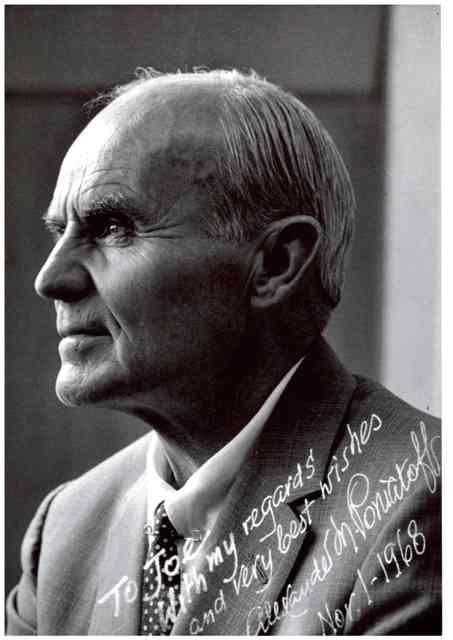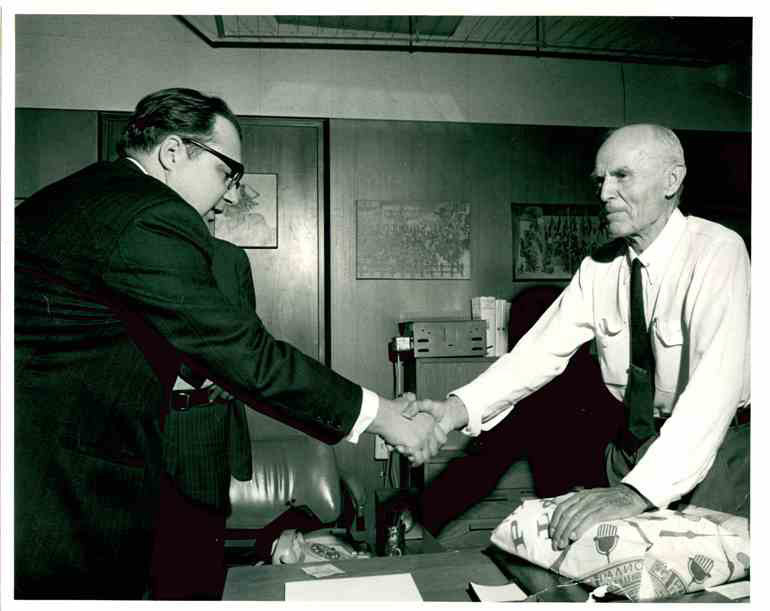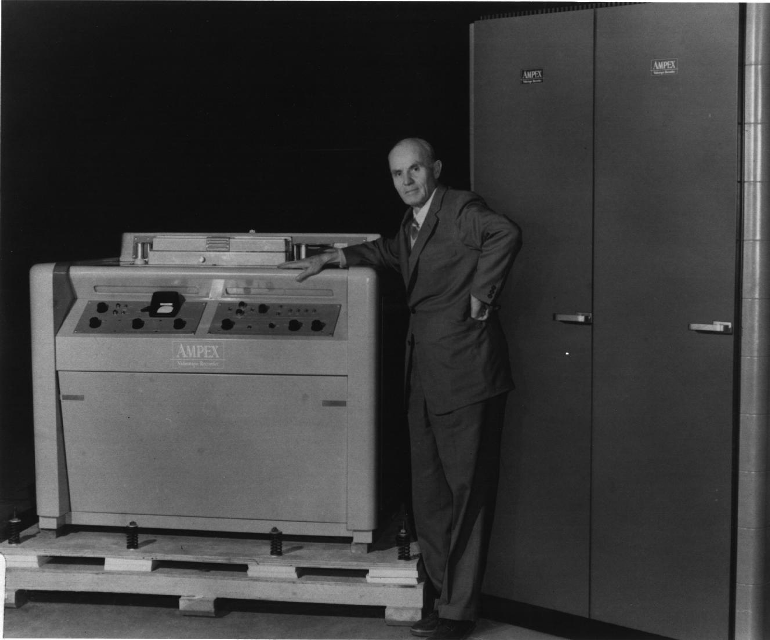
Alexander M. Poniatoff, the Oscar-winning engineer
/ Главная / Russkiy Mir Foundation / Publications / Alexander M. Poniatoff, the Oscar-winning engineerAlexander M. Poniatoff, the Oscar-winning engineer
Svetlana Smetanina
This year marks the centenary of the Russian exodus. Above all, it is meant to commemorate our compatriots who greatly contributed to the achievements of mankind with their work and talent. Alexander M. Poniatoff, the creator of the video recorder, was one of those people. His name was inscribed in the world history of inventions.

Alexander M. Poniatoff, 1968. Photo credit: Museum of History of Kazan University
“A man’s life is not complete unless he has made a contribution to humanity”
Mentioning the name of Alexander Poniatoff, a White Guard and an emigrant, was banned in the Soviet Union for a long time. And only in the 1990s, after the inventor’s death, the relatives in Russia learned about his life in the USA. And a few years ago, a small exposition dedicated to the renowned fellow-countryman was opened at the Museum of History of Kazan University.
“The museum was contacted by Nikolai Alekseevich Komissarov, a descendant of Alexander Poniatoff. He is the inventor’s grand-nephew. The Poniatoff's family was scattered after the revolution - some stayed in Russia, others ended up abroad. And it was 1990 when the part of the family in Kazan received a letter stating that they had relatives in the United States,” says Svetlana Frolova, director of the Museum of History of Kazan University.
However, the USSR authorities knew very well about Poniatoff and his invention. Back in 1959, products from the United States were presented for the first time at an exhibition in Sokolniki, and the VCR invented by Poniatoff was demonstrated there. Furthermore, the exhibition was attended by distinguished guests - Vice President (and future President) of the United States Richard Nixon and General Secretary of the CPSU Nikita Khrushchev.
That time, with the inventor’s consent, Soviet specialists were able to take photos of all the technical documentation and even disassembled the video recorder to see its internal structure. And after the exhibition, Ampex presented Khrushchev with a videocassette. It had footage of his conversation with the US President at the exhibition. Soon the USSR launched production of its own video tape recorders. Nevertheless, the most important video broadcasts were recorded on Ampex equipment since Soviet technology was inferior to the American one.

Meeting of V.G. Makoveev (head of the All-Soviet Research Institute of Television and Radio Broadcasting of the USSR State Television and Radio Broadcasting) with Alexander M. Poniatoff, 1974.
Photo credit: Museum of History of Kazan University
“When relatives living in Russia found out about Alexander Poniatoff, it sparked their interest. So they began to collect materials about him. As to bringing Poniatoff’s name back to the inventor’s historical homeland, it was Nikolai Komissarov who made all the difference. Unfortunately, he has passed away. Yet, he was an amazing enthusiast who did a lot to make the name of Alexander Poniatoff known in Russia. Thanks to him and the materials he handed over to us, our museum arranged the exposition dedicated to the fate and activities of our fellow countryman.
The exposition is small, but there are photographs from Alexander Poniatoff’s archive. There is also a medal dedicated to the inventor with his motto inscribed on its frame: "A man’s life is not complete unless he has made a contribution to humanity." This medal was established by Ampex in honor of its founder and long-term leader,” says Svetlana Frolova.
Ampex videotape and medal with Alexander Poniatoff’s motto. Photo credit: Museum of History of Kazan University
Kazan - Moscow - Karlsruhe - Shanghai - California
Alexander Poniatoff studied at a non-classical secondary school in Kazan. In Soviet times, this building housed the Kazan Pedagogical Institute, and now it is a part of the complex of the Kazan Federal State University. Young Alexander showed his brilliant mathematical skills in the non-classical secondary school, and having finished it he continued his studies at the Faculty of Mathematics of Kazan University. After a short while, he managed to be transferred to the Moscow Imperial Technical School. But even this education did not seem to be enough for the inquisitive young man, and he asked his father, a wealthy timber merchant, to pay for his studies at the polytechnic college in the German city of Karlsruhe.
When the First World War began, leaving Germany for Russia turned out to be very difficult. So Poniatoff virtually fled it through neighboring countries. The young man became enthusiastic about aviation that was gaining popularity back then. Having graduated from the flight school in Petrograd, he served in the air division of the Baltic Fleet. That was followed by the October Revolution, which he did not accept, and service in the Kolchak’s army.
After the defeat of the White Guards, Alexander Poniatoff fled to Shanghai, where he found work as an electrician. But his main dream was to get to the USA, although he had to wait for entry permit for seven long years. That was challenging time of complete uncertainty, and the Shanghai Botanical Garden became his escape, where he sat in silence and read books. Poniatoff used to call this garden “his church” in memoirs.
In Shanghai, he was hospitalized with yellow fever. At some point, the situation even became critical. In the meantime time, one of the patients - an Englishman - gave Poniatoff Natural Healing, a book about human body's reserves that enable you to maintain health in natural ways and without medicines. Subsequently, Alexander Poniatoff did his best to follow the principles outlined in the book for his whole life. Perhaps that was behind the fact that he lived such a long, fruitful life and worked almost until passing away. Having retired from the direct management of the company, every morning Alexander Poniatoff came to his personal office, which was kept for him, and spent the first half of the day there taking a close look at the business of his brainchild.
Combine picture and sound
In 1944, when he was 54, Alexander M. Poniatoff founded Ampex, using his initials A.M.P. plus "ex" for "excellence" to create his company’s name. Initially, it produced electric motors and generators for military radars. But after the end of World War II, it was necessary to urgently look for a new niche. And then the talented engineer came across the magnetophon, a German device for sound recording. The company took it as basis and developed its own reel-to-reel tape recorder.
And soon the idea came to make a video recorder, which turned out to be a very ambitious plan. Much later, in one of his interviews Alexander Poniatoff admitted that if he had known back then all the challenges to be faced, it would have been very unlikely for him even to try to cope with that task. Moreover, there was neither funding, nor research laboratories. But Poniatoff always did his best to hire talented and capable people, regardless of their diplomas and degrees. And his team did not disappoint their leader.
The biggest challenge was to combine the television signal and the audio one: the video signal took up a bandwidth 500 times wider than the sound. But the company's employees led by Poniatoff managed to develop the quadrature scanning. And this know-how became a real paradigm shift. Already in November 1956, there was the first recorded transmission of TV news, not the live one.
Back then, the first Ampex VCR looked like a huge machine, which also cost US$ 50,000 (US$750,000 at current prices). The marketing department wondered who would buy them. However, more than 70 VCR devices were sold just four days after its premiere. And by 1962, the number of sold video tape recorders reached one thousand. Most US cinemas had the professional equipment by Ampex, and the company’s head, Alexander Poniatoff, received prestigious Oscar and Emmy tor his contribution to development of the film industry.

Alexander Poniatoff with the first VCR. Photo credit: Habrahabr.info
”Take nothing as a dogma”
Alexander Poniatoff always strived to support his compatriots. According to his relatives, the Russian diaspora in northern California feels reverence for him almost as for a saint because of his enormous contribution to preserving the image of Russia among emigrants. “He gave jobs to thousands of his compatriots. He helped open an Orthodox nunnery in the United States, established a shelter for the elderly people, and donated large amounts of money to charity. And he ordered to plant two birch trees near the entrances of all branches of Ampex, even in Africa where special domes were installed over the birches to avoid their drying due to the hot climate,” says Svetlana Frolova.
As remembered by those who worked with Alexander Poniatoff, his Russian nature made him very different from reserved American top managers. He related to his subordinates directly, set objectives and inspired them to achieve those objectives working together with them.
The director of the Museum of History of Kazan University quotes Alexander Poniatoff’s rules of life set out in his memoirs: “Learn all your life. Take nothing as a dogma. Always try to do more than is expected of you. Avoid conflicts."
Alexander Poniatoff had no direct heirs, so a certain part of his archives was lost. Nevertheless, the memory of him lives on. Thus, the Alexander Poniatoff Museum has been established at Stanford University. And the Museum of the History of Kazan University hosts commemoration gatherings dedicated to the renowned inventor.
Speaking of Ampex, as it often happens, the company failed to keep the level set by its founder. While under Poniatoff's management, his company led the VCR market for several decades. But after his retirement in 1988, the company’s business began to decline, and in 2014 it was finally liquidated.
New publications

 Mikhail Kalatozov, a director who transformed the world of cinematography in many ways, was born 120 years ago. He was a Soviet film official and a propagandist. Above all, he was capable of producing movies that struck viewers with their power and poetic language.
Mikhail Kalatozov, a director who transformed the world of cinematography in many ways, was born 120 years ago. He was a Soviet film official and a propagandist. Above all, he was capable of producing movies that struck viewers with their power and poetic language.  Ukrainian authorities have launched a persecution campaign against the canonical Ukrainian Orthodox Church (UOC), the biggest one in the country's modern history. Over the past year, state sanctions were imposed on clergy representatives, searches were conducted in churches, clergymen were arrested, criminal cases were initiated, the activity of the UOC was banned in various regions of the country, and monasteries and churches were seized.
Ukrainian authorities have launched a persecution campaign against the canonical Ukrainian Orthodox Church (UOC), the biggest one in the country's modern history. Over the past year, state sanctions were imposed on clergy representatives, searches were conducted in churches, clergymen were arrested, criminal cases were initiated, the activity of the UOC was banned in various regions of the country, and monasteries and churches were seized.  When Nektary Kotlyaroff, a fourth-generation Russian Australian and founder of the Russian Orthodox Choir in Sydney, first visited Russia, the first person he spoke to was a cab driver at the airport. Having heard that Nektariy's ancestors left Russia more than 100 years ago, the driver was astonished, "How come you haven't forgotten the Russian language?" Nektary Kotlyaroff repeated his answer in an interview with the Russkiy Mir. His affinity to the Orthodox Church (many of his ancestors and relatives were priests) and the traditions of a large Russian family brought from Russia helped him to preserve the Russian language.
When Nektary Kotlyaroff, a fourth-generation Russian Australian and founder of the Russian Orthodox Choir in Sydney, first visited Russia, the first person he spoke to was a cab driver at the airport. Having heard that Nektariy's ancestors left Russia more than 100 years ago, the driver was astonished, "How come you haven't forgotten the Russian language?" Nektary Kotlyaroff repeated his answer in an interview with the Russkiy Mir. His affinity to the Orthodox Church (many of his ancestors and relatives were priests) and the traditions of a large Russian family brought from Russia helped him to preserve the Russian language.

 The leaders of the Friends of the Great Russia cultural association (Amici Della Grande Russia) in Italy believe that the Western policy of abolishing Russian culture in Europe has finally failed. Furthermore, it was doomed to failure from the beginning.
The leaders of the Friends of the Great Russia cultural association (Amici Della Grande Russia) in Italy believe that the Western policy of abolishing Russian culture in Europe has finally failed. Furthermore, it was doomed to failure from the beginning.  Name of Vladimir Nemirovich-Danchenko is inscribed in the history of Russian theater along with Konstantin Stanislavski, the other founding father of the Moscow Art Theater. Nevertheless, Mr. Nemirovich-Danchenko was a renowned writer, playwright, and theater teacher even before their famous meeting in the Slavic Bazaar restaurant. Furthermore, it was Mr. Nemirovich-Danchenko who came up with the idea of establishing a new "people's" theater believing that the theater could become a "department of public education."
Name of Vladimir Nemirovich-Danchenko is inscribed in the history of Russian theater along with Konstantin Stanislavski, the other founding father of the Moscow Art Theater. Nevertheless, Mr. Nemirovich-Danchenko was a renowned writer, playwright, and theater teacher even before their famous meeting in the Slavic Bazaar restaurant. Furthermore, it was Mr. Nemirovich-Danchenko who came up with the idea of establishing a new "people's" theater believing that the theater could become a "department of public education."  "Russia is a thing of which the intellect cannot conceive..." by Fyodor Tyutchev are famous among Russians at least. December marks the 220th anniversary of the poet's birth. Yet, he never considered poetry to be his life's mission and was preoccupied with matters of a global scale. Mr.Tyutchev fought his war focusing on relations between Russia and the West, the origins of mutual misunderstanding, and the origins of Russophobia. When you read his works today, it feels as though he saw things coming in a crystal ball...
"Russia is a thing of which the intellect cannot conceive..." by Fyodor Tyutchev are famous among Russians at least. December marks the 220th anniversary of the poet's birth. Yet, he never considered poetry to be his life's mission and was preoccupied with matters of a global scale. Mr.Tyutchev fought his war focusing on relations between Russia and the West, the origins of mutual misunderstanding, and the origins of Russophobia. When you read his works today, it feels as though he saw things coming in a crystal ball...